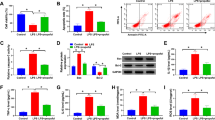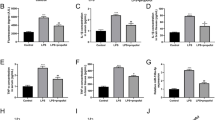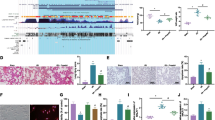Abstract
Propofol (PPF) is reported to play a protective role in ischemia/reperfusion (I/R) injury, including cerebral ischemia–reperfusion injury (CIRI). This study aims to investigate the mechanism by which PPF ameliorates CIRI. Kunming mice were used to establish the middle cerebral artery occlusion (MCAO)/reperfusion mouse model in vivo. PPF pre-treatment was performed before CIRI. Lactate dehydrogenase (LDH) and creatine phosphokinase (CPK) levels were detected to evaluate the tissue injury. PC12 cells were exposed to hypoxia/reoxygenation (H/R) to construct the in vitro CIRI model, and PC12 cells were pre-treated with PPF before H/R. Quantitative real-time polymerase chain reaction (qRT-PCR) was employed to detect the expression of lncRNA MALAT1 and miR-182-5p. Flow cytometry was used to detect the apoptosis of PC12 cells. Bioinformatics analysis, qRT-PCR, dual-luciferase reporter gene experiments, and RNA immunoprecipitation (RIP) experiments were performed to predict and validate the targeting relationship between MALAT1 and miR-182-5p. Western blot was used to detect Toll-like receptor 4 (TLR4) expression at protein level. PPF pre-treatment remarkably inhibited LDH and CPK levels in the serum of the mice with CIRI, and reduced the apoptosis of PC12 cells exposed to H/R. Besides, PPF pre-treatment markedly suppressed MALAT1 expression in both in vivo and in vitro models and upregulated miR-182-5p expression. MiR-182-5p was validated to be a downstream target gene of MALAT1, and MALAT1 could increase the expression of TLR4 by suppressing miR-182-5p. The effects of PPF on the injury of the mice brain and PC12 cells were partly counteracted by the restoration of MALAT1. PPF protects the brain against I/R-induced injury by regulating MALAT1/miR-182-5p/TLR4 axis.






Similar content being viewed by others
Availability of Data and Materials
The data used to support the findings of this study are available from the corresponding author upon request.
References
Li, Y., W. Zhong, Z. Jiang, and X. Tang. 2019. New progress in the approaches for blood-brain barrier protection in acute ischemic stroke. Brain research bulletin 144: 46–57.
Wu, R., X. Li, P. Xu, L. Huang, J. Cheng, X. Huang, J. Jiang, L.-J. Wu, and Y. Tang. 2017. TREM2 protects against cerebral ischemia/reperfusion injury. Molecular Brain 10 (1): 20.
Walsh, C.T. 2018. Propofol: Milk of Amnesia. Cell 175 (1): 10–13.
Romuk, E.B., W. Szczurek, P.G. Nowak, E. Hudziec, E. Chwalinska, and E. Birkner. 2016. Effects of propofol on the liver oxidative-antioxidant balance in a rat model of Parkinson’s disease. Advances in clinical and experimental medicine : Official organ Wroclaw Medical University 25 (5): 815–820.
Zheng G, Qu H, Li F, Ma W, and Yang H. 2018. Propofol attenuates sepsis-induced acute kidney injury by regulating miR-290–5p/CCL-2 signaling pathway. Brazilian journal of medical and biological research = Revista brasileira de pesquisas medicas e biologicas, 51(11):e7655.
Yan, H.J., G.Q. Qi, and Y. Ma. 2019. Effect of propofol on myocardial ischemia-reperfusion injury through MAPK/ERK pathway. European review for medical and pharmacological sciences 23 (24): 11051–11061.
Wei, Q., J. Zhao, X. Zhou, L. Yu, Z. Liu, and Y. Chang. 2019. Propofol can suppress renal ischemia-reperfusion injury through the activation of PI3K/AKT/mTOR signal pathway. Gene 708: 14–20.
Li, Q, Cui, S, Jing, G, Ding, H, Xia, Z, and X. He. 2019. The role of PI3K/Akt signal pathway in the protective effects of propofol on intestinal and lung injury induced by intestinal ischemia/reperfusion1. Acta cirurgica brasileira, 34(1):e20190010000005.
Geisler, S., and J. Coller. 2013. RNA in unexpected places: Long non-coding RNA functions in diverse cellular contexts. Nature reviews Molecular cell biology 14 (11): 699–712.
Wu, H., H. Zhu, Y. Zhuang, J. Zhang, X. Ding, L. Zhan, S. Luo, Q. Zhang, F. Sun, M. Zhang, et al. 2020. LncRNA ACART protects cardiomyocytes from apoptosis by activating PPAR-gamma/Bcl-2 pathway. Journal of cellular and molecular medicine 24 (1): 737–746.
Shi, H., Z. Dong, and H. Gao. 2019. LncRNA TUG1 protects against cardiomyocyte ischemia-reperfusion injury by inhibiting HMGB1. Artificial cells, nanomedicine, and biotechnology 47 (1): 3511–3516.
Yan Y, Song, D, Song X, Song, C. 2019. The role of lncRNA MALAT1 in cardiovascular disease. IUBMB life.
Wei, L., J. Li, Z. Han, Z. Chen, and Q. Zhang. 2019. Silencing of lncRNA MALAT1 prevents inflammatory injury after lung transplant ischemia-reperfusion by downregulation of IL-8 via p300. Molecular therapy Nucleic acids 18: 285–297.
Ruan, Z., S. Wang, W. Yu, and F. Deng. 2019. LncRNA MALAT1 aggravates inflammation response through regulating PTGS2 by targeting miR-26b in myocardial ischemia-reperfusion injury. International journal of cardiology 288: 122.
Zhang, T., Y. Ma, L. Gao, C. Mao, H. Zeng, X. Wang, Y. Sun, J. Gu, Y. Wang, K. Chen, et al. 2019. MicroRNA-146a protects against myocardial ischemia reperfusion injury by targeting Med1. Cellular & molecular biology letters 24: 62.
Li, M., L. Luan, Q. Liu, Y. Liu, X. Lan, Z. Li, and W. Liu. 2019. MiRNA-199a-5p protects against cerebral ischemic injury by down-regulating DDR1 in rats. World neurosurgery 131: e486–e494.
Wang, J., Z. Xu, X. Chen, Y. Li, C. Chen, C. Wang, J. Zhu, Z. Wang, W. Chen, Z. Xiao, et al. 2018. MicroRNA-182-5p attenuates cerebral ischemia-reperfusion injury by targeting Toll-like receptor 4. Biochemical and biophysical research communications 505 (3): 677–684.
Wang, Y., Y. Zhen, X. Wu, Q. Jiang, X. Li, Z. Chen, G. Zhang, L. Dong, et al. 2015. Vitexin protects brain against ischemia/reperfusion injury via modulating mitogen-activated protein kinase and apoptosis signaling in mice. Phytomedicine 22 (3): 379–384.
He, X., Y. Zheng, S. Liu, S. Shi, Y. Liu, Y. He, C. Zhang, and X. Zhou. 2018. MiR-146a protects small intestine against ischemia/reperfusion injury by down-regulating TLR4/TRAF6/NF-κB pathway. Journal of Cellular Physiology 233 (3): 2476–2488.
Wang, Q., P. Lin, P. Li, L. Feng, Q. Ren, X. Xie, and J. Xu. 2017. Ghrelin protects the heart against ischemia/reperfusion injury via inhibition of TLR4/NLRP3 inflammasome pathway. Life Sciences 186: 50–58.
Mickey, B.J., A.T. White, A.M. Arp, K. Leonardi, M.M. Torres, A.L. Larson, D.H. Odell, S.A. Whittingham, M.M. Beck, J.E. Jessop, et al. 2018. Propofol for treatment-resistant depression: A pilot study. International Journal of Neuropsychopharmacology 21 (12): 1079–1089.
Xu, F, Ma, R, Zhang,, G, Wang, S, Yin J, Wang, E, Xiong, E, Zhang Q, and Li. Y. 2018. Estrogen and propofol combination therapy inhibits endoplasmic reticulum stress and remarkably attenuates cerebral ischemia-reperfusion injury and OGD injury in hippocampus. Biomedicine & pharmacotherapy = Biomedicine & pharmacotherapie, 108:1596–1606.
Chen, C.-Y., Y.-F. Tsai, W.-J. Huang, S.-H. Chang, and T.-L. Hwang. 2018. Propofol inhibits endogenous formyl peptide-induced neutrophil activation and alleviates lung injury. Free Radical Biology & Medicine 129: 372–382.
Thiry, J.-C., P. Hans, G. Deby-Dupont, A. Mouythis-Mickalad, V. Bonhomme, and M. Lamy. 2004. Propofol scavenges reactive oxygen species and inhibits the protein nitration induced by activated polymorphonuclear neutrophils. European Journal of Pharmacology 499 (1–2): 29–33.
Lv, J., Y. Liang, Y. Tu, J. Chen, and Y. Xie. 2018. Hypoxic preconditioning reduces propofol-induced neuroapoptosis via regulation of Bcl-2 and Bax and downregulation of activated caspase-3 in the hippocampus of neonatal rats. Neurological Research 40 (9): 767–773.
Li, Y., D. Zhong, L. Lei, Y. Jia, H. Zhou, and B. Yang. 2015. Propofol prevents renal ischemia-reperfusion injury via inhibiting the oxidative stress pathways. Cellular Physiology and Biochemistry 37 (1): 14–26.
Yu, W., D. Gao, W. Jin, S. Liu, and S. Qi. 2018. Propofol prevents oxidative stress by decreasing the ischemic accumulation of succinate in focal cerebral ischemia-reperfusion injury. Neurochemical research 43 (2): 420–429.
Sun, B., H. Ou, F. Ren, Y. Huan, T. Zhong, M. Gao, and H. Cai. 2018. Propofol inhibited autophagy through Ca/CaMKKβ/AMPK/mTOR pathway in OGD/R-induced neuron injury. Molecular Medicine 24 (1): 58.
Xi, H.-J., T.-H. Zhang, T. Tao, C.-Y. Song, S.-J. Lu, X.-G. Cui, and Z.-Y. Yue. 2011. Propofol improved neurobehavioral outcome of cerebral ischemia-reperfusion rats by regulating Bcl-2 and Bax expression. Brain Research 1410: 24–32.
Ma, M., J. Hui, Q.-Y. Zhang, Y. Zhu, Y. He, and X.-J. Liu. 2018. Long non-coding RNA nuclear-enriched abundant transcript 1 inhibition blunts myocardial ischemia-reperfusion injury via autophagic flux arrest and apoptosis in streptozotocin-induced diabetic rats. Atherosclerosis 277: 113–122.
Eltzschig, H.K., and T. Eckle. 2011. Ischemia and reperfusion–from mechanism to translation. Nature Medicine 17 (11): 1391–1401.
Wang, J.-X., X.-J. Zhang, Q. Li, K. Wang, Y. Wang, J.-Q. Jiao, C. Feng, S. Teng, L.-Y. Zhou, Y. Gong, et al. 2015. MicroRNA-103/107 regulate programmed necrosis and myocardial ischemia/reperfusion injury through targeting FADD. Circulation Research 117 (4): 352–363.
Li, W., J.-Z. Ning, F. Cheng, W.-M. Yu, T. Rao, Y. Ruan, R. Yuan, X.-B. Zhang, Y. Du, and C.-C. Xiao. 2018. MALAT1 promotes cell apoptosis and suppresses cell proliferation in testicular ischemia-reperfusion injury by sponging MiR-214 to modulate TRPV4 expression. Cellular Physiology and Biochemistry 46 (2): 802–814.
Zhang, T., H. Wang, Q. Li, J. Fu, J. Huang, and Y. Zhao. 2018. MALAT1 activates the P53 signaling pathway by regulating MDM2 to promote ischemic stroke. Cellular Physiology and Biochemistry 50 (6): 2216–2228.
Jiang, W., G. Liu, and W. Tang. 2016. MicroRNA-182-5p ameliorates liver ischemia-reperfusion injury by suppressing Toll-like receptor 4. Transplantation Proceedings 48 (8): 2809–2814.
Ming, N., H.S.T. Na, J.-L. He, Q.-T. Meng, and Z.-Y. Xia. 2019. Propofol alleviates oxidative stress via upregulating lncRNA-TUG1/Brg1 pathway in hypoxia/reoxygenation hepatic cells. Journal of biochemistry 166 (5): 415–421.
Acknowledgements
We thank Hubei Yican Health Industry Co., Ltd (Wuhan, Hubei, China) for its linguistic assistance during the preparation of this manuscript.
Author information
Authors and Affiliations
Contributions
Conceived and designed the experiments: Yubo Hu, Junyang Chen; performed the experiments: Yubo Hu, Cong Ye, Shuang Cheng, Junyang Chen; analyzed the data: Yubo Hu, Cong Ye, Shuang Cheng; wrote the paper: Yubo Hu, Shuang Cheng, Junyang Chen.
Corresponding author
Ethics declarations
Ethics Approval and Consent to Participate
Our study was approved by the Ethics Review Board of China-Japan Union Hospital of Jilin University (Approval number: 20190107C009).
Consent for Publication
All authors read and approved the final manuscript.
Competing Interests
The authors declare no competing interests.
Additional information
Publisher's Note
Springer Nature remains neutral with regard to jurisdictional claims in published maps and institutional affiliations.
Supplementary Information
Below is the link to the electronic supplementary material.
Rights and permissions
About this article
Cite this article
Hu, Y., Ye, C., Cheng, S. et al. Propofol Downregulates lncRNA MALAT1 to Alleviate Cerebral Ischemia–Reperfusion Injury. Inflammation 44, 2580–2591 (2021). https://doi.org/10.1007/s10753-021-01525-9
Received:
Revised:
Accepted:
Published:
Issue Date:
DOI: https://doi.org/10.1007/s10753-021-01525-9




